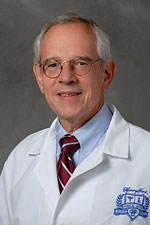 Prof. Michael Chopp has continued his leadership of an outstanding research group at Henry Ford Hospital (HFH). An internationally recognized expert in the development and treatment of stroke, Prof. Chopp was one of a small international group of scientists invited by the World Health Organization to Geneva to discuss how best to study and treat this disease. He was also invited to give four plenary lectures on this topic at international conferences (as well as many other talks). In support of his research, Prof. Chopp received four major grants from the National Institutes of Health (NIH) to HFH this year. Prof. Michael Chopp has continued his leadership of an outstanding research group at Henry Ford Hospital (HFH). An internationally recognized expert in the development and treatment of stroke, Prof. Chopp was one of a small international group of scientists invited by the World Health Organization to Geneva to discuss how best to study and treat this disease. He was also invited to give four plenary lectures on this topic at international conferences (as well as many other talks). In support of his research, Prof. Chopp received four major grants from the National Institutes of Health (NIH) to HFH this year. The focus of Prof. Chopp's research is the development of treatments for stroke. His goal is to salvage affected brain tissue. He and his group have recently identified novel death pathways of brain cells after stroke. After the onset of a stroke, brain cells undergo self destruction, a form of programmed cell death. This suicidal process is programmed by genetic alterations. They have identified proteins and genes resposible for the promotion of this form of cell death. With this knowledge, they may be able to intervene to inhibit this suicidal process of cell death. They have also found that after a stroke secondary events contribute to the growth of the dead tissue. A major contributing factor to this secondary injury is the influx of white blood cells into the region of damage. They have identified the signalling molecules that target these cells to the site of injury and have blocked the function of these molecules. Their data indicate that using this therapeutic approach the amount of injured brain tissue is decreased by a factor of two, and that they can significantly reduce damage from stroke. Prof. Chopp and his group have also developed novel imaging methods using magnetic resonance imaging (MRI) that permit the non invasive evaluation of the health status of brain tissue. These techniques allow them to identify whether brain cells are simply affected and compromized by the stoke, are in the process of dying or are already dead. This imaging modality may have an important impact on the treatment of stroke patients and will likely improve the management of these patients. |